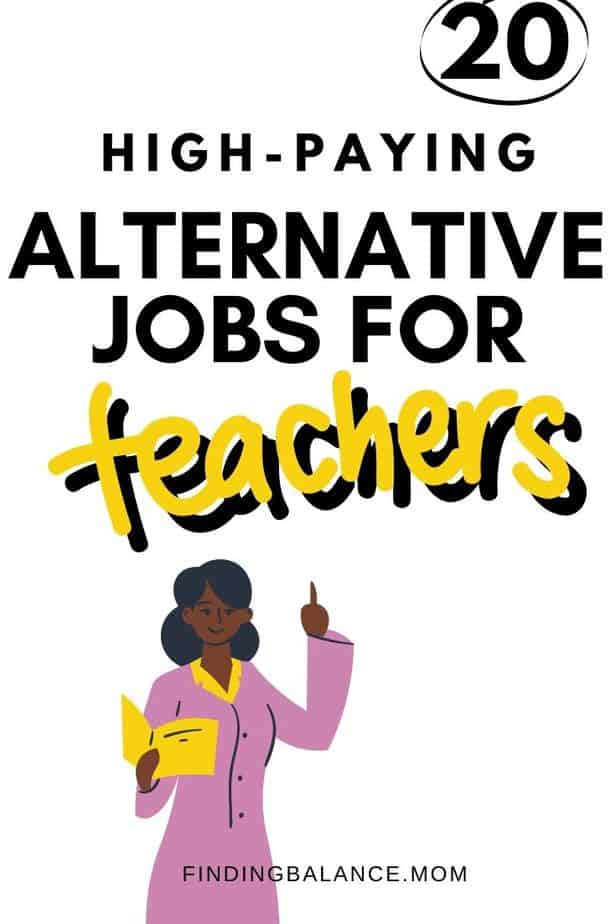Teaching can be a very rewarding and meaningful job for moms.
But if you have little kids and feel the need to be home with them, you may feel the need to test an alternative career.
Or maybe you are just looking to use your teaching skills in a different context. That’s fine.

Whatever your reason is, if you’ve ever found yourself asking:
*As an Amazon Associate I earn from qualifying purchases. This post may contain affiliate links from Amazon or other publishers I trust (at no extra cost to you). See disclosure for details.
What else can I do with my teaching degree?
What jobs are there for ex-teachers?
What is a good career change for teachers?
What jobs are suitable for ex-teachers?
Are there jobs for teachers other than teaching?
This is the blog post for you!
Side Note: Check out our list of online jobs for moms.
The List of Most Profitable Non-Teaching Jobs in Education.
Alternative Jobs for English Teachers
1. Real Estate Agent

Former teachers can put their communication and interpersonal skills into real estate and do excellent in it. The duties of a real estate agents are to work as a middle man between buyers and sellers of real estate. He facilitates sale for commercial and residential real estate, they educate clients on good communities, tour them and homes they can buy and live in.
This is a perfect alternative job idea for and ex-teacher and the national average salary for real estate agent is $86,109.
2. Writing Jobs for former teachers

Did you know that writers are now hot sought for far much more than ever? The demand for writers is unbelievable. If you quit your teaching job today, writing can be a perfect fit for you since teaching requires strong writing skills which you already have.
As a mom looking for good job alternatives for teachers, writing would not just be the best option for you, but it will pay you well and can be the key job to help you begin actualizing your financial independent goal.
As a writer, you could be a freelance writer, be an in-house writer for a Publishing company, business organizations or better, start your own blog and make unbelievable income even from the comfort of your home.
Read more on how to start your writing journey. The national average salary for writers is $62,460.
3. Textbook Author

This make another good and suitable alternative career for English teachers. As a textbook author, your responsibilities are writing and publishing materials used in schools. Base on the standards and grade level of the textbook you write at a time, you receive guidelines from the publishers. You may be required have good technical writing and bachelor’s degree in English.
The national average salary for a Textbook Author is $69,000 per year.
4. Postsecondary Educator

Postgraduate educators work in colleges, universities, and sometimes community colleges. They can also become academic advisors, work in admission, and in the registrar’s office in universities and colleges. This is also a good job alternative for teachers as they can work remotely with online schools.
What you need to work at this career change for teachers; Postgraduate educator is a degree in masters and advancing with a doctorate will do better with more benefit.
The national average salary for Postgraduate educators is $75,430.
5. Human Resource Specialist

A suitable career change for moms is the job of a human resource specialist. You need to have interpersonal skills to successfully work at this job as you would be working with new different people. Your responsibilities are recruiting, hiring, and training of new staff for companies. You plan and implement training for the new employees you are hiring for your clients.
The national average salary for this job is $59,180 annually.
6. Adult Literacy/Education

There are adults never learned to write or read due to learning disabilities, some could be immigrants who need to learn new language or improve their literacy to qualify them for a job. Most adults voluntarily enroll in night schools and genuinely wish to learn. These adults enrolled into Adult Education Institutes who need adult educators. You can work in these institutions or start yours. Your teaching skills will offer you an upper hand to work at this job. Jobs in adult education offer up great career changes for teachers. If you find delight in helping others improve their self-esteem and confidence, this will be fulfilling career for you.
The national average salary is $53,000 and exceeding plus flexible working hours.
7. Instructional Coordinator

When you are looking into great career changes for teachers that are moms, you may consider working as an instructional coordinator. An instructional coordinator works to keep up with modern innovations. They focus on adapting curriculum and information to fit the needs of students. A master’s degree is a fit for a position in instructional coordination or design.
Their average salary per year is $64,000.
8. Life Coach

You may consider working as a life coach when thinking of alternative teaching jobs. A life coach provides their clients with more than one perspective to seeking and attaining their dreams and goals in life. These clients could be executives of fortune five hundred companies looking to improve their work-life or normal lifestyles. You could get clients in your locality and online as well. Branding yourself as a life coach online (Social media most especially) could increase your chances of getting hired.
Life coaches, make an average income of around $62,000 per year according to the Bureau of Labor Statistics.
9. Assistant Teacher

Assistant teachers work in the classroom just like class teachers, but unlike class teachers, they perform less duties. Their duties are performing assessment and curriculum development. This helps them have more free time during the weekends and nights not marking homework nor exams scripts. This is a good career alternative for moms who want to stop teaching but still enjoy being in the classroom.
They earn a national average salary of $26,970 annually.
10. Event Planning for Ex-Teachers

From securing an accurate location, meals, transportation, decoration to other aspects of an event, the obligations of event planners are to organize and coordinate the whole aspects of events. It could be birthdays, wedding ceremonies, conventions or meetings of different kinds. Your planning, organizational, and management skills makes you a fit for this job as you plant to quit your teaching career.
The national average salary for an event planner is $49,370
11. Childcare Career as An Alternative Career for Teachers.

Childcare is another good choice job for ex-teachers especially for moms. Your responsibility is to spend time with children taking care of them daily.
Working as a childcare give you the privilege to work with children of different ages and help them grow as better, responsible, and productive children. You can work with busy professionals or alone and in private homes or daycare organizations.
The national average salary for childcare personnel is $23,240 or more depending on who you are working with.
12. School and Career Counselor

School and career counselor help students figure out what skills and education they need in respect to their future career. You could work in schools primarily, colleges, NGOs, career centers and in both private and public sectors. This job choice makes a perfect fit for moms as well.
They earn $54,560 as an annual salary.
Did you know How much an average American earns? These statistics tell it all.
13. Substance Abuse Counselor

This career consists helping people recover from alcoholism, drug and other form of addictions. Substance abuse counselor is an entry-level job position for moms with a bachelor’s degree or maybe advance degree of master’s or LADAC (Licensed Alcohol and Drug Counselor).
Substance abuse counselor job position can also be suitable government job for teachers outside of education.
They have an average salary of $41,070 annually.
14. Standardized Test Developer

Teaching moms can consider the role of a standardized test developer if you want still play in the education sector. Test developers write questions and answers for standardized tests that are used across the country. High school, bachelor’s or master’s degrees, any of these will give you an entry into the role of standardized test developer. The national average salary for standardized test developer $61,000 per year.
15. Corporate Trainer

The need for corporate trainers rises as companies need to develop their employees for high performers. For moms who quit or plan to quit their teaching job, they can take a hold on the job of corporate trainers. Corporate trainers teach and train employees the adequate knowledge and skills to perform excellently in their field of careers or jobs. They are normally hired by business organizations to teach their employees new skill(s).
They earn between $41,000 to $82,000 per year.
Alternative Jobs for History Teachers
16. Museum Curator

Moms with teaching expertise can transfer their expertise to being museum curators. Museum curators’ duties are collecting, storing and exhibiting art. They plan displays, events and shows that engages and benefits their targeted audience.
Museum curators earn average salary of $47,360.
17. Museum Archivist

Museum Archivist makes a significant museum team member. Their duties cut across finding, acquiring and authenticate historical museum arts and documents. They as well organize, classify and safeguard museum articles for fast retrieval and also direct workers to arrange and exhibit art collections.
They earn an annual salary of $52,358
18. Education Policy and Research

Another perfect alternative teaching job for moms is education policy and researcher.
Education policy researchers look at case studies to determine what type of policies have worked, which ones have failed and work on ways to better them. Education policy and research jobs usually require a master’s degree in either education or public policy.
They make an average salary of $60,000 yearly with a steady job growth. This job requires a degree in masters.
Alternative Jobs for Math Teachers
19. Personal Financial Advisor

This is making a good choice alternative job for math teachers. Talking about personal financial advisor, being a mom who taught math in the classroom, you can fine this job a suitable alternative career for you, a former teacher. Personal financial advisor works with individuals especially entrepreneurs to help them make great financial conclusions. What makes this alternative job is the flexibility of working from home and you don’t work all the time.
The national average salary for personal financial advisors is $67,414.
20. Wholesale Sales Representative

Moms who taught Math in their former teaching career can work smoothly as wholesale representative. Your primary duties as a wholesale sales rep is selling goods to companies and organizations. You buy needed products from the manufacturers at a wholesale price and sell to organizations in need of these products. Your teaching skills as a former teacher in addition to interpersonal skills would help you at this job.
The national average salary for a wholesale sales representative is $57,906.
Final Thoughts on Second Education Careers for Teachers.
believe by now you do not have further worries about deciding what best alternative career to choose after you finally decide to quit your teaching job. Any job from this list of jobs listed above is perfect for you depending on your test or plan from now on.
Thank you for reading through, here are some others posts you’ll find educating.
29 Legit Work From Home Jobs That Provide Equipment
Working from home is convenient and flexible, but can be expensive getting the required equipment….
Working From Home Tips For Maximum Productivity
Working from home is now a thing many people love to do because it is…
Work From Home Essentials That You Need In 2022
Working from home is a good thing because it comes with freedom, flexibility, and other…
How’s Work From Home? – Pros & Cons (+ Real Life Reviews)
42% of workers in the United States work from home full-time, but how’s work from…




